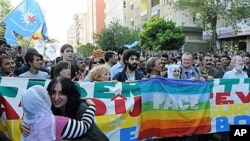The controversial trial of nearly 200 leading members of the country's main legal Kurdish party is due to resume on Thursday in Turkey. The defendants, which include elected officials, are accused of being part of a terrorist network linked to the Kurdish insurgent group the PKK.
The case is the largest of its kind in more than decade and comes as Kurdish groups are seeking a peaceful solution to more than 25 years of fighting. Tensions are rising ahead of the trial.
Hundreds of people battled with police in towns and cities Sunday across the predominantly Kurdish southeast of Turkey, protesting the trial.
At a news conference, Aysel Tugluk, head of a Kurdish umbrella group DTK, called for an end to the trial.
"This freak of law should come to an end, and in order to proceed with a truly democratic Turkey, what is necessary is for true law to be realized," Tugluk said. "Our arrested friends should be immediately released."
Tugluk was the joint leader of Turkey's main Kurdish party, the DTP, until it was closed down by the constitutional court last year for supporting the PKK. The court also expelled her from parliament.
In a separate court case, Tugluk also is facing decades in jail for speeches she made.
The defendants in Thursday's trial also face similarly long sentences if convicted. The trial is part of a wider investigation, with nearly 2,000 members arrested from the pro-Kurdish BDP.
Ergemen Bagis, Turkey's minister for EU membership, however, said the investigation is not politically motivated.
"The detentions were not because they were members of a political party, because they were channeling, according to the allegations of the prosecutors, funds from the municipalities to the terrorist organization. And when you talk to the BDP members, they are confused, they get orders from different places, and they get contradicting orders, that are not a very democratic approach," said Bagis.
The terrorist organization to which Bagis is referring is the PKK, which has been fighting the Turkish state for greater Kurdish rights since 1984. The PKK has called a cease-fire until next June's general election, and last month the BDP, along with other Kurdish groups, launched a civil campaign for greater rights, centered on using the Kurdish language. Some analyst say the move is an important sign the struggle for Kurdish rights could be moving away from an armed struggle to a more peaceful one.
Political scientist Cengiz Aktar warns, though, that Thursday's trial, along with the ongoing legal crackdown, can only undermine such efforts.
"It's very counterproductive of course, it's clearly counterproductive," said Aktar. "I mean there is no way we can talk about a solution for the Kurdish problem while there is a trial involving elected members of Kurdish politics."
One of those on trial is the mayor of Diyarbakir, Osman Baydemir. He is a leading figure within the Kurdish movement and a key architect in the civilian initiative. He declared that the armed struggle is no longer relevant.
Observers warn that the fate of people like Baydemir could well determine the direction of the Kurdish struggle.
But the government is resolutely standing behind the prosecutions, accusing the BDP of failing to disassociate itself from the PKK.
That stance, experts say, will play well with its nationalist conservative voters, which it's courting ahead of next June's election. Election considerations also are cited as a reason why the ruling AK party is shelving its own initiative for Kurdish reforms until after the polls.
Gultan Kisanak, joint leader of the Kurdish party BDP, said the government is playing a dangerous game. "If you say the guns should be silenced, let's all talk and make our suggestions for solution together," she said. "Let's not leave it to tomorrow, to the aftermath of the elections. Let's not prepare the ground for more clashes after the June 12th election."
Observers say such a call is likely to go unheeded, especially as the country is entering an election period. They also say pictures of leading Kurdish figures in court can only strengthen the ruling AK party's credentials among its conservative nationalist base.
Tensions in Streets of Turkey Ratcheting Up Before Kurdish Trial
- By Dorian Jones











